Regioselectivity - Study guides, Class notes & Summaries
Looking for the best study guides, study notes and summaries about Regioselectivity? On this page you'll find 33 study documents about Regioselectivity.
Page 2 out of 33 results
Sort by

-
Chem 210 Exam II with complete solutions already graded A+
- Exam (elaborations) • 6 pages • 2023
-
Available in package deal
-
- $13.99
- + learn more
electrophiles electron seeking reagents that have room to accept a electron pair nucleophiles reagents seeking a nucleus to which to donate a pair of electrons proton transfer or protonation reaction the transfer of a proton from one base to another transition state lying between the products and reactants free energy of activation (delta G double dagger) the height of the barrier, the energy that the reactants attain in reaching the the transition state e...
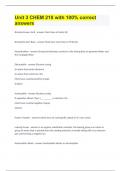
-
Unit 3 :CHEM 210 with 100% correct answers
- Exam (elaborations) • 4 pages • 2023
-
Available in package deal
-
- $13.99
- + learn more
Bronsted-Lowry Acid Must Have a Proton (H) Bronsted-Lowry Base Must have Lone Pairs or Pi Bonds Neutralization Strong Acid donates a proton to the Strong Base to generate Water and the Conjugate Base Electrophile Electron Loving An atom that wants electrons. An atom that is electron rich. Must have a partial positive charge. (Cation) Nucleophile Nucleus Loving If opposites attract, then a _________ is electron rich. Must have a partial negative charge. (An...
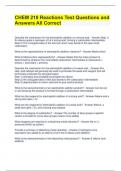
-
CHEM 210 Reactions Test Questions and Answers All Correct
- Exam (elaborations) • 3 pages • 2024
-
Available in package deal
-
- $7.59
- + learn more
CHEM 210 Reactions Test Questions and Answers All Correct Describe the mechanism for the electrophilic addition of a strong acid. - Answer-Step 1) An alkene grabs a hydrogen off of a strong acid, forming a carbocation intermediate. Step 2) The conjugate base of the acid (an anion now) bonds to the open shell carbocation What is the regioselectivity of electrophilic addition reactions? - Answer-Markovnikov What is Markovnikov regioselectivity? - Answer-States that the major product is d...
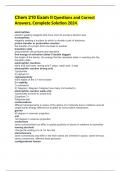
-
Chem 210 Exam II Questions and Correct Answers, Complete Solution 2024.
- Exam (elaborations) • 4 pages • 2024
-
- $11.39
- + learn more
Chem 210 Exam II Questions and Correct Answers, Complete Solution 2024. electrophiles electron seeking reagents that have room to accept a electron pair nucleophiles reagents seeking a nucleus to which to donate a pair of electrons proton transfer or protonation reaction the transfer of a proton from one base to another transition state lying between the products and reactants free energy of activation (delta G double dagger) the height of the barrier, the energy that the reactants a...
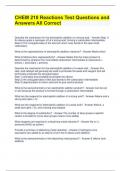
-
CHEM 210 Reactions Test Questions and Answers All Correct
- Exam (elaborations) • 3 pages • 2024
-
Available in package deal
-
- $8.49
- + learn more
CHEM 210 Reactions Test Questions and Answers All Correct Describe the mechanism for the electrophilic addition of a strong acid. - Answer-Step 1) An alkene grabs a hydrogen off of a strong acid, forming a carbocation intermediate. Step 2) The conjugate base of the acid (an anion now) bonds to the open shell carbocation What is the regioselectivity of electrophilic addition reactions? - Answer-Markovnikov What is Markovnikov regioselectivity? - Answer-States that the major product is d...
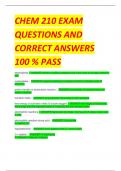
-
CHEM 210 EXAM QUESTIONS AND CORRECT ANSWERS 100 % PASS
- Exam (elaborations) • 4 pages • 2023
-
- $8.79
- + learn more
CHEM 210 EXAM QUESTIONS AND CORRECT ANSWERS 100 % PASS electrophiles - ANSWER electron seeking reagents that have room to accept a electron pair nucleophiles - ANSWER reagents seeking a nucleus to which to donate a pair of electrons proton transfer or protonation reaction - ANSWER the transfer of a proton from one base to another transition state - ANSWER lying between the products and reactants free energy of activation (delta G double dagger) - ANSWER the height of the barrier,...
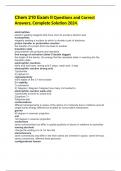
-
Chem 210 Exam II Questions and Correct Answers, Complete Solution 2024.
- Exam (elaborations) • 4 pages • 2024
-
- $9.99
- + learn more
Chem 210 Exam II Questions and Correct Answers, Complete Solution 2024. electrophiles electron seeking reagents that have room to accept a electron pair nucleophiles reagents seeking a nucleus to which to donate a pair of electrons proton transfer or protonation reaction the transfer of a proton from one base to another transition state lying between the products and reactants free energy of activation (delta G double dagger) the height of the barrier, the energy that the reactants a...
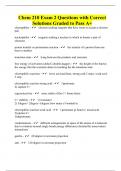
-
Chem 210 Exam 2 Questions with Correct Solutions Graded to Pass A+
- Exam (elaborations) • 5 pages • 2023
-
Available in package deal
-
- $11.99
- + learn more
electrophiles - electron seeking reagents that have room to accept a electron pair nucleophiles - reagents seeking a nucleus to which to donate a pair of electrons proton transfer or protonation reaction - the transfer of a proton from one base to another transition state - lying between the products and reactants free energy of activation (delta G double dagger) - the height of the barrier, the energy that the reactants attain in reaching the the transition state e...
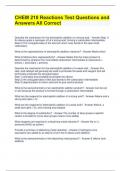
-
CHEM 210 Reactions Test Questions and Answers All Correct
- Exam (elaborations) • 3 pages • 2024
- Available in package deal
-
- $8.49
- + learn more
CHEM 210 Reactions Test Questions and Answers All Correct Describe the mechanism for the electrophilic addition of a strong acid. - Answer-Step 1) An alkene grabs a hydrogen off of a strong acid, forming a carbocation intermediate. Step 2) The conjugate base of the acid (an anion now) bonds to the open shell carbocation What is the regioselectivity of electrophilic addition reactions? - Answer-Markovnikov What is Markovnikov regioselectivity? - Answer-States that the major product is d...
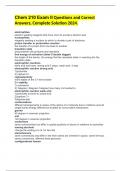
-
Chem 210 Exam II Questions and Correct Answers, Complete Solution 2024.
- Exam (elaborations) • 4 pages • 2024
-
- $11.49
- + learn more
Chem 210 Exam II Questions and Correct Answers, Complete Solution 2024. electrophiles electron seeking reagents that have room to accept a electron pair nucleophiles reagents seeking a nucleus to which to donate a pair of electrons proton transfer or protonation reaction the transfer of a proton from one base to another transition state lying between the products and reactants free energy of activation (delta G double dagger) the height of the barrier, the energy that the reactants a...

Study stress? For sellers on Stuvia, these are actually golden times. KA-CHING! Earn from your study resources too and start uploading now. Discover all about earning on Stuvia


